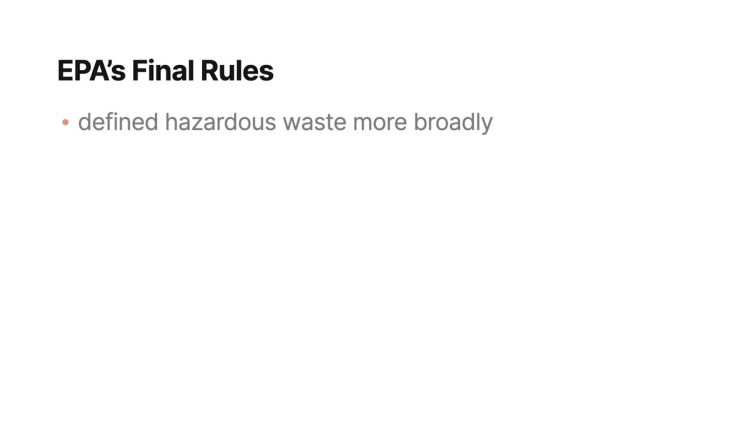Shell Oil Co. v. Environmental Protection Agency
United States Court of Appeals for the District of Columbia Circuit
950 F.2d 741 (1991)
- Written by Kathryn Lohmeyer, JD
Facts
The Environmental Protection Agency (EPA) (defendant) issued a notice of proposed rulemaking to (1) identify and classify nine characteristics typical of hazardous wastes and (2) provide a list of wastes definitively determined to be hazardous. The EPA’s proposed regulation would treat non-listed wastes as non-hazardous, as long as testing showed none of the nine identified characteristics. The listed hazardous wastes would be subject to regulation, but waste generators could elect to perform tests demonstrating that a presumptively hazardous waste should be exempt. During the comment period, industry participants raised generalized concerns about the proposed rules, including the proposed listing system. The EPA also indicated that it would provide a procedure for de-listing wastes improperly listed as presumptively hazardous. After notice and comment, the EPA issued two final rules that significantly changed the regulatory scheme initially proposed. First, the mixture rule provided that any mixture including a listed hazardous waste was presumptively hazardous. Second, the derived-from rule provided that any residue derived from the treatment of hazardous wastes was also hazardous. Shell Oil Company and other companies (plaintiffs) petitioned for review of the EPA’s final rules, arguing that the rules had been issued in violation of the procedural requirements for rulemaking under the Administrative Procedure Act (APA), 5 U.S.C. § 551 et seq.
Rule of Law
Issue
Holding and Reasoning (Per curiam)
What to do next…
Here's why 907,000 law students have relied on our case briefs:
- Written by law professors and practitioners, not other law students. 47,100 briefs, keyed to 996 casebooks. Top-notch customer support.
- The right amount of information, includes the facts, issues, rule of law, holding and reasoning, and any concurrences and dissents.
- Access in your classes, works on your mobile and tablet. Massive library of related video lessons and high quality multiple-choice questions.
- Easy to use, uniform format for every case brief. Written in plain English, not in legalese. Our briefs summarize and simplify; they don’t just repeat the court’s language.





